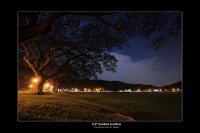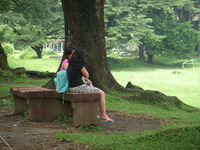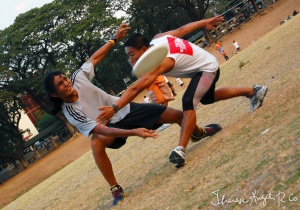UP Sunken Garden: Difference between revisions
| Line 92: | Line 92: | ||
[[Image:Ultimate_Frisbee_01.jpg|300px|thumb|right|photo by Therese Angeli R. Co]] | [[Image:Ultimate_Frisbee_01.jpg|300px|thumb|right|photo by Therese Angeli R. Co]] | ||
<br/> | <br/> | ||
---- | |||
==Sources== | |||
*Romualdo, Arlyn VCD. "Tales from UP Diliman: fact or fiction?". The UP Newsletter. May 2011. Vol.32 Issue 05. Web. 11 March 2012. <http://www.up.edu.ph/upnewsletter2.php?i=1452&pg=1463&pgidx=&pgmax=1&issue=77> | |||
*Tobias, Mae Astrid. "UPD Grandstand gets a facelift". 2004. Web. 11 March 2012. <http://www.up.edu.ph/oldsystem/newsletter/previous/2004nov25.htm#grandstand> | |||
[[Category:UP Diliman]][[Category:Venues]] | [[Category:UP Diliman]][[Category:Venues]] | ||
Revision as of 10:01, 13 March 2012

University of the Philippines Sunken Garden
Next to the Oblation Plaza, the Sunken Garden would be the most famous landmark of the University of the Philippines System. It is in the heart of the 2.2 km. Academic Oval surrounded by acacia trees. It has been the most favorable place for the UP and non-UP communities for its wide and shady area to present a place for a number of activities. The setting of the sun provides a perfect backdrop for the people who want to spend time in the Garden.

A. Background
The official name of the Sunken Garden is General Antonio Luna Parade Grounds. It is a five-hectare area of vast land covered with grass and surrounded by acacia trees. It is the largest vacant land in the campus where different outdoor activities are performed such as training, parade, concerts. Sports clubs also use it regularly. The Sunken Garden got its name because of its physical appearance as being recessed or sunken. It belonged to the UP ROTC since 1949. The UP Sunken Garden is most commonly known for being the location for the annual UP Fair.
B. Rumors about the Sunken Garden
There are two rumors about the Sunken Garden. One is that a fault line runs through the Academic Oval which many people think that it is the West Marikina Valley Fault and thought to be the reason of the sinking of the Sunken Garden. The other one is that the Sunken Garden continues to sink for one to ten centimeters a year. The first rumor was answered by the interview of UP Newsletter to Prof. Alfredo Mahar Francisco A. Lagmay from the UPD National Institute of the Geological Sciences. According to Prof. Lagmay, there is no existing fault line beneath the length of the Academic Oval which also means that there is no fault line down below the Sunken Garden. He also stated that the West Marikina Valley Fault is approximately three kilometers away from the UPD campus.
As for the sinking of the Sunken Garden every year, there are no studies that can reason out that the Sunken Garden and the Main Library are really sinking relative to the campus.[1]
C. Why is the Sunken Garden sunken?
As suspected by Prof. Lagmay, the reason why Sunken Garden recessed is maybe because of the campus waterway system. According to him, the creek from Philcoa goes into the campus, passes through the lagoon and it is split into two around the Main Library which each of them runs along the sides of the Sunken Garden. He also made a theory that the creek that used to cut the Sunken Garden was filled with soil and made the water split and divert from its original flow.[2]
D. Surrounding Buildings
The UP Sunken Garden is surrounded by a number of buildings:
To its North lies the Malcolm Hall—UP College of Law
To its South lies the UP College of Education—College of Education
To its East lies the Vinzons Hall (where one has an exact view of the Garden) and the UP College of Business Administration
To its West is the UP Main Library—University Library or UP Main Library
E. Surrounding Artifacts
Aside from the buildings, the Sunken Garden is also circumferenced by artifacts like the following:
1. Beltran

These are the benches that line the edges of the Sunken Garden. They give a more comfortable option for those who are not too fond of Indian-sitting/sitting on the grass. They were built in memory of the late and highly respected Luis Beltran. In fact, each bench bears the name of a colleague or a friend of him.
2. Acacia Trees
The view of the Sunken would not be complete without the trees that encircle it. The trees are mainly Acacia trees where students and non-students stay under its shades for school work and other activities.
3. Grandstand
The old Grandstand witnessed most of the traditions that was gathered in the Sunken Garden. The design of the old Grandstand was a box-like structure that resembles a waiting shed. The renovation of the Grandstand was initiated by Mr. Vicente Quimbo, an alumnus of the College of Business Administration. According to him, the University has lots of traditions behind the Sunken Garden and some of them have been lost. Building a new grandstand will make people come and somehow make the old traditions come back.
Mr. Quimbo is the founder of the Bel Mondo Italia Corp., makers of Novellino Wines. He donated the funds for the restoration of the new Diliman Grandstand which overlooks the Sunken Garden. The design of the new grandstand was inspired by the torii. Torii is the gateway of a Shinto temple. The new Grandstand was designed by Architect Froilan Hong of the Office of the Campus Architect and it was constructed by Mariestad Industries.[3]
F. Events
1. Cadena de Amor Festival
Cadena de Amor is a lost student tradition of UP sponsored by the UP Woman's Club. It was introduced in 1934 by Ursula U. Clemente. The annual ritual gathered both junior and senior year coeds who linked themselves in massive human chains by passing cadena de amor garlands. The ritual symbolized the turning over of responsibilities from seniors to juniors. The ritual was well loved and was called "the festival of girls and flowers". The student reception changed radically in the 1960s when UP students began to question the relevance of such traditions especially against the turbulent and violent times. Many viewed the ritual as degrading, since it had passed from being an annual leavetaking ceremony to a beauty contest. Because it was seen as "burgis" or bourgeois, the ritual was last held in 1968--a year that led to the turbulent events of the First Quarter Storm.
2. ROTC
The General Luna Parade grounds is where ROTC Cadets undergo their Citizens Military Training or CMT. Every weekend, a large gathering of males stand and march in the field for hours. It is also the venue for the annual presentation of corps sponsors at the end of first semester.
3. Latagaw Cup
Through the year, the Sunken becomes a venue for a lot of sport activities and festivals. One of which is the Latagaw Cup , a soccer event competed by various student organizations inside the University of the Philippines. Philippine indigenous games are also held here as part of the celebration of the UP Diliman Month during February.
4. UP Fair
After UP’s lantern parade, the next event that every UP student looks forward to is the UP Fair. Held every February, UP Fair is home to the aspiring, upcoming, and famous bands. The UP Fair is known for its wild crowd having a great time. The barricaded Sunken Garden accommodates various booths and rides for the UP Fair Crowd.
-
Father and son playing catch
-
student contemplating
-
sweet moments
E. Interaction with People
Five hectares of grass, just think of the things you can do in it. Why not turn it into your personal writing pad like some ingenious people. They used crumpled newspapers to form words like “Happy Birthday....” or “I love ….”as their mode of expression. The Sunken Garden is also used as an extension of the library. Students find peace and quiet to study here or to simply relax. During summer, you will see Frisbee throwers, kite flyers with kites of different shapes and sizes all over the field, people having picnic together. You will also see father and son or the whole family playing catch. Sunken Garden is infamous for its nightly liaisons. Even during daytime, you will find couples having their sweet time here. The UP Sunken Garden equates to many things to different people.

Sources
- Romualdo, Arlyn VCD. "Tales from UP Diliman: fact or fiction?". The UP Newsletter. May 2011. Vol.32 Issue 05. Web. 11 March 2012. <http://www.up.edu.ph/upnewsletter2.php?i=1452&pg=1463&pgidx=&pgmax=1&issue=77>
- Tobias, Mae Astrid. "UPD Grandstand gets a facelift". 2004. Web. 11 March 2012. <http://www.up.edu.ph/oldsystem/newsletter/previous/2004nov25.htm#grandstand>







